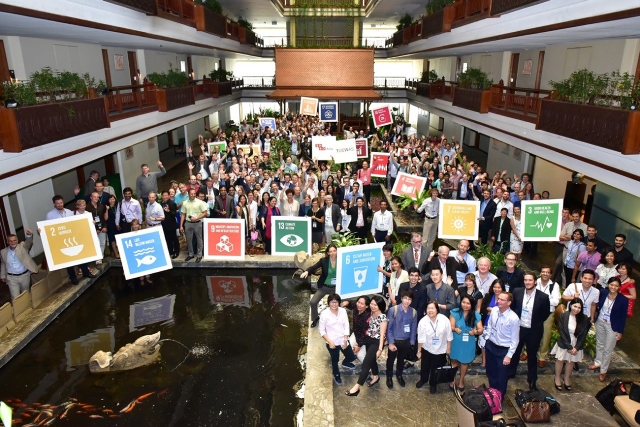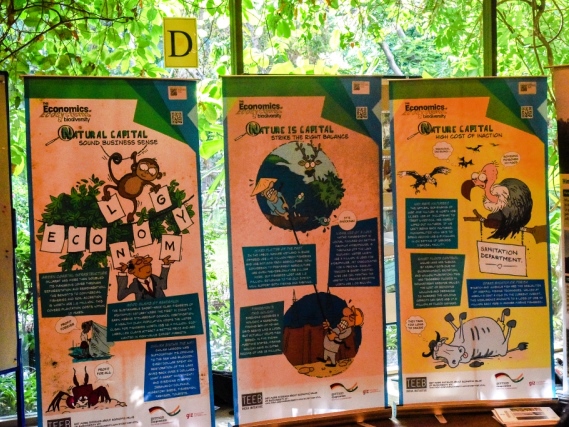31 May, 2016
A conference, organised to discuss the significance of the United Nations Sustainable Development Goals (SDGs) for the GIZ projects was held in Bangkok from 31 may-2 June, 2016. The conference was jointly organised by the two sector networks of the GIZ- TUEWAS (Transport, Environment, Energy and Water in Asia), and SNRD Asia (Natural Resources and Rural Development in Asia).

More than 250 GIZ experts participated in the conference jointly organised by TUEWAS and SNRD

The IBBI team presented a poster highlighting the linkages between Business and SDGs
In this session, Mr. Endrukaitis and Mr. Piyush highlighted the linkages between businesses and SDGs, and the importance to engage the business sector through an interactive presentation. The team also shared success stories emerging out of the India Business and Biodiversity Initiative (IBBI), which is a forerunner initiative worldwide and aims to link SDG 14,15 and 17.
* To visit the IBBI poster, please click
* To visit the "How to Reduce Footprint" poster, please click
Dr. Aaron Lobo, was nominated as the co-speaker for the CZM & CC working group. He took over this role from Mr. Terence Dacles who is based in the Philippines. He will serve this group along with the speaker Dr. Stefan Groenewold. This is one of the six technical working groups of SNRD Asia.
.jpg)
.jpg)
In pictures (left) Participants of the thematic workshop on Transboundary conservation, (right) Members of the CZM & CC working group discussion
Dr. Aaron Lobo co-organised a thematic workshop titled ‘Transboundary Resource Management - insights from the afflicted’. Dr. Lobo made a presentation on the challenges of managing a local MPA in a transboundary ecosystem seascape using examples of the Gulf of Mannar and the Palk Bay. Other cases that were discussed included the transboundary conservation initiative between India, Nepal and Bhutan Greater Kailash Sacred landscape in the Himalayas and a transboundary initiative between Thailand, Laos and Cambodia pertaining to the Mekong river.
The CMPA Project participated in the CZM & CC (Coastal Zone Management and Climate Change) Working Group. The main objective of the CZM & CC Work Group was to create a lively platform for knowledge exchange which enhance up-scaling of successful models and methods for problem solving. To this effect Dr. Aaron Lobo made a presentation on the titled ‘Honoring the Goal: as though marine conservation mattered’.

Three posters based on the TII learnings were presented, the themes of the posters being Sound Business Sense, Strike the Right Balance, High Cost of Inaction
TEEB India Initiative (TII) has developed interesting posters with illustrations and cartoons for communicating the results of TII. The posters were presented by Mr Ravindra and Mr Ritesh, as a tool for effectively communicating biodiversity conservation to different stakeholders. After a brief presentation on the process behind TII and its results, a discussion was opened to explore effectiveness of the posters in communicating scientific and technical findings of TII, and their implications for decision makers and other stakeholders.
* To visit the TII poster on Sound Business Sense, please click
* To visit the TII poster on Strike the Right Balance, please click
* To visit the TII poster on High Cost of Inaction, please click

Participants being introduced to the three posters
© 2014 IGBP. All Rights Reserved.
Site By: Virtualpages
